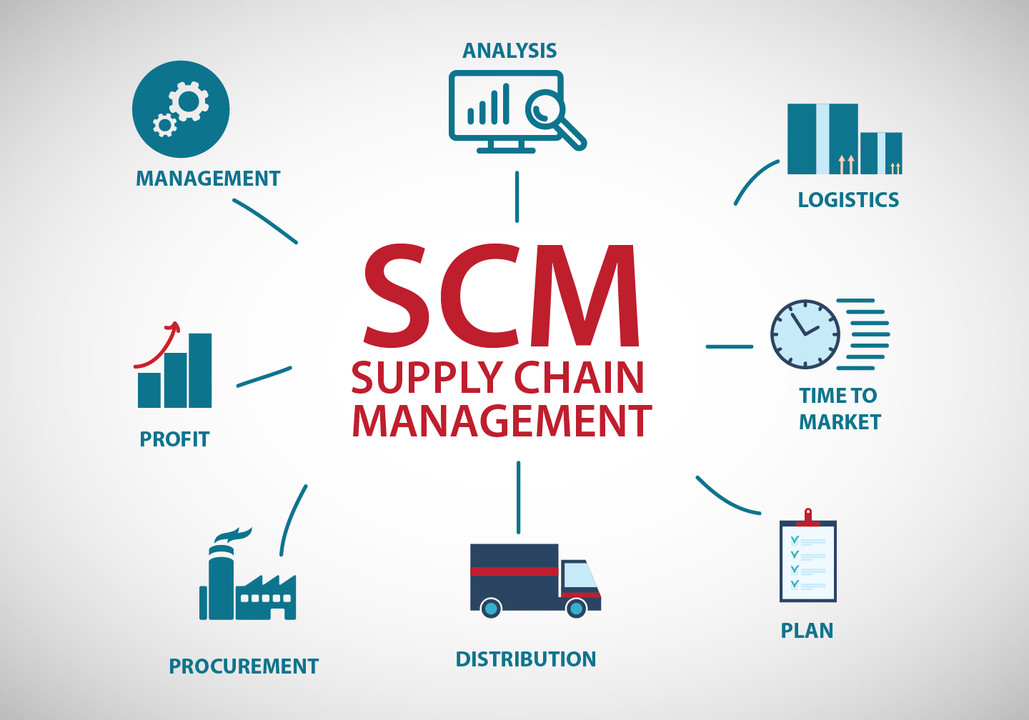Supply chain management (SCM) is a vital process that connects all the stages of producing and delivering a product or service, from raw materials to final customers. In this blog, we will explore what SCM is, how it works and why it is important for businesses of all sizes and industries.
Imagine a journey that starts with a farmer growing cotton and ends with a customer wearing a T-shirt. Along the way, there are many steps involved, such as harvesting, processing, manufacturing, packaging, transporting, distributing, and selling. These steps are part of the supply chain, the network of entities that work together to create and deliver a product or service. Supply chain management (SCM) is the process of planning, coordinating and controlling the supply chain activities to optimize efficiency, quality and customer satisfaction. This blog will explain what SCM is, how it works and why it matters for your business success.

How does supply chain management work?
Supply chain management (SCM) works by coordinating and overseeing the various activities involved in producing, distributing, and delivering goods or services from their source to the end customer. SCM works by linking the different entities that make up the supply chain, such as suppliers, manufacturers, distributors, retailers, and consumers. SCM works by streamlining a business’s supply-side activities to maximize customer value and gain a competitive advantage in the marketplace. SCM works by using various tools and techniques, such as planning, sourcing, manufacturing, logistics, delivery, and returns, to optimize efficiency, quality, and customer satisfaction.
How supply chains can benefit from being agile and responsive?
The modern supply chain is expansive, intricate, and in a constant state of transformation, demanding agility to ensure its effectiveness. In the past, supply chains operated under a linear model that catered to the needs of businesses and customers without much regard for change. However, today’s consumers have a multitude of options for purchasing goods, both in physical stores and online, and they expect increasingly personalized experiences. An agile supply chain is capable of meeting these evolving expectations.
Moreover, supply chain sourcing has become fluid and dynamic. Geopolitical and economic developments can significantly impact the manufacturing supply chain. If a manufacturer faces a shortage of aluminum from a particular supplier due to trade policies, they must swiftly adapt and find alternative sources. The ability to promptly reconfigure the supply chain is vital in effectively addressing such scenarios. Agility plays a crucial role in facilitating real-time adjustments like these.
The challenges faced by the supply chain go beyond efficiency and cost management. Changing circumstances can also impact regulatory compliance. To mitigate the impacts caused by supply chain changes, including diverse and evolving regulatory requirements, your supply chain management (SCM) system must exhibit flexibility. An intelligent SCM system can enhance efficiency, reduce costs, and ensure compliance with an array of ever-changing legal mandates.
Benefits of supply chain management in business:
Supply chain management in business has many benefits that can improve the performance and profitability of a company. Here are some lines that you can use to write about it:
- Supply chain management (SCM) is the handling of the entire production flow of a good or service, from the raw materials to the final delivery to the customer. SCM can help businesses reduce costs, waste and time, as well as increase quality, customer satisfaction and competitive advantage.
- By managing the supply chain effectively, businesses can optimize their resources, processes, and relationships across the supply chain network. SCM can help businesses plan and manage their supply and demand, source and procure their materials and services, manufacture and test their products, deliver and distribute their goods, and handle returns and feedbacks.
- SCM can also help businesses respond to changing market conditions, customer preferences and disruptions. SCM can help businesses analyze data from their supply chain partners, identify potential problems and opportunities, and adjust their strategies accordingly. SCM can also help businesses innovate and differentiate their products and services, and create value for their customers and stakeholders.
The future of supply chain management is a topic that attracts a lot of interest and attention from businesses and researchers. Supply chain management (SCM) is the handling of the entire production flow of a good or service, from the raw materials to the final delivery to the customer. SCM is facing many challenges and opportunities in the 21st century, as the world becomes more connected, complex, and uncertain.
As the world becomes more volatile, uncertain, complex, and ambiguous (VUCA), supply chains need to adapt and transform to survive and thrive. Supply chain management (SCM) is the discipline of managing the flow of goods and services across the supply chain network. SCM is undergoing a digital revolution, as new technologies enable more visibility, agility, resilience and sustainability.
The future of supply chain management holds immense promise and potential. With the rapid advancements in technology, the rise of automation, and the growing focus on sustainability, supply chains are poised to undergo transformative changes. By embracing agility, leveraging innovative technologies, and adopting sustainable practices, businesses can gain a competitive edge and unlock new opportunities for growth. As we move forward, it is crucial for organizations to adapt, evolve, and embrace the transformative power of supply chain management to navigate the complexities of a rapidly changing world and create a more resilient, efficient, and sustainable future for all.






